Lego Super Mario review: "It's a-me, Lego Mario!"
It's "Lego Mario Time" in T3's official Lego Super Mario review

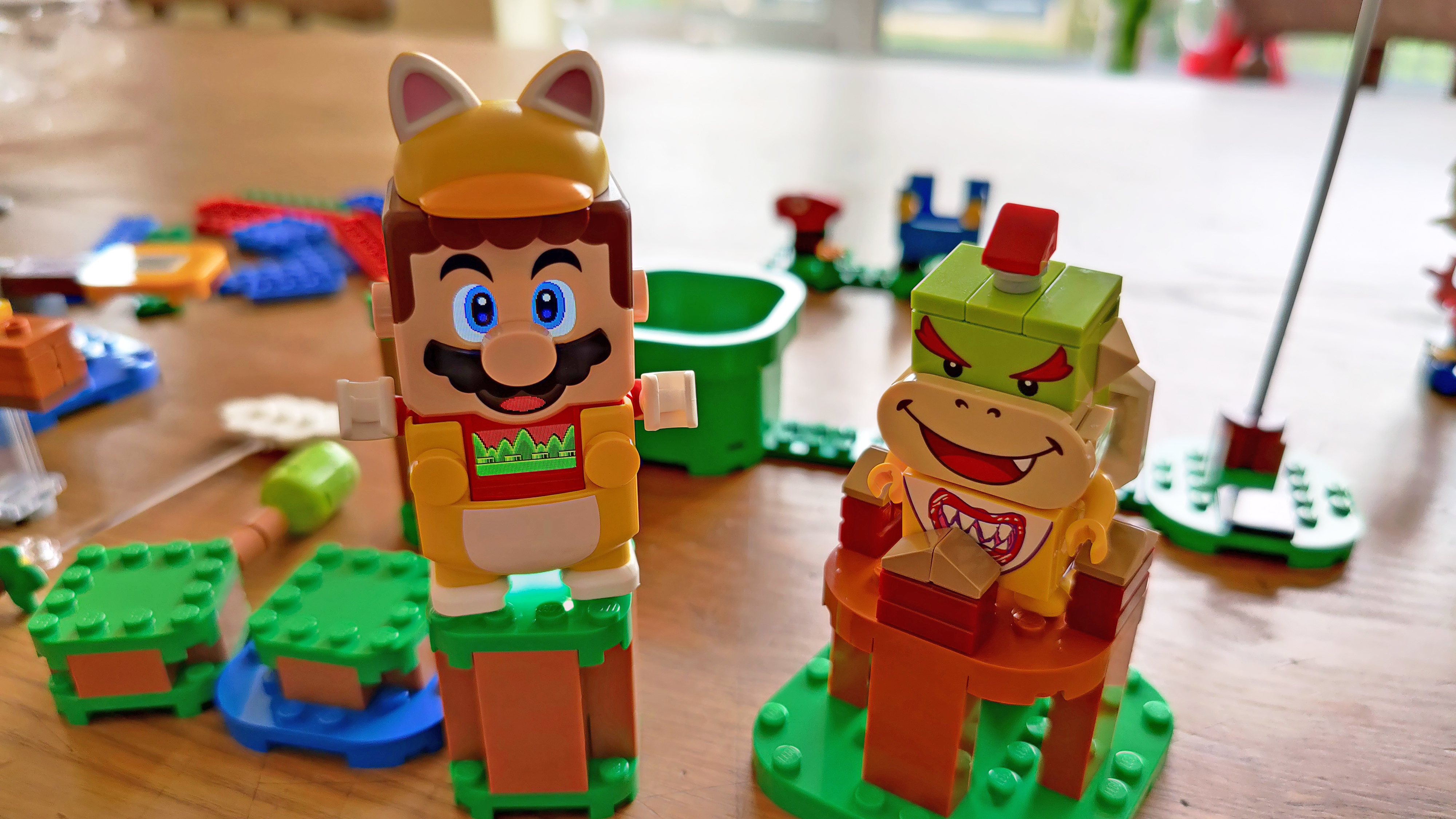
Super Mario Maker goes physical with Lego Super Mario, letting children build their own levels and then have the portly plumber navigate them with a selection of power-ups, costumes and challenges. There's both a creative build and play aspect to the sets, while the companion app allows levels and scores to be shared among friends. Mario, as ever, though is the star, with his "wahaas" and "woohoos" guaranteed to spark joy in children or adults alike.
-
+
Lego Mario himself is great fun
-
+
Creative level-building aspect is brilliant
-
+
Companion app is slick and useful
-
+
Running a level has a challenge factor and results are recorded
-
+
Generic Lego can be used to augment official sets
-
+
Lego Super Mario sets are visually arresting and unique
-
-
Starter Course definitely needs augmenting to build a large level
-
-
Digital instructions require a phone or tablet
-
-
Only Mario is available as a playable character right now
-
-
Larger sets don't come cheap
Why you can trust T3

Welcome to T3's official Lego Super Mario review. Over the past week or so I've been testing out a number of Lego Super Mario sets with my 10-year-old daughter, and what follows is my considered take.
Lego Super Mario is the latest cross-over from the Danish brick masters and features Nintendo's portly Italian plumber and his colourful, mushroom-filled world. The basic idea is that now people can create their very own, physical, Lego Super Mario levels, and then have plenty of fun by running through them.
Each run sees Lego Mario having to traverse various obstacles, beat a selection of baddies, as well as reach an end flag in under the time limit. I'll go into more detail later, but I think the best way to show how Lego Super Mario works is to show a video of my daughter running through a level she built.
Enjoy!
Lego Super Mario review: How it works video
Lego Super Mario review: Price, release date and sets
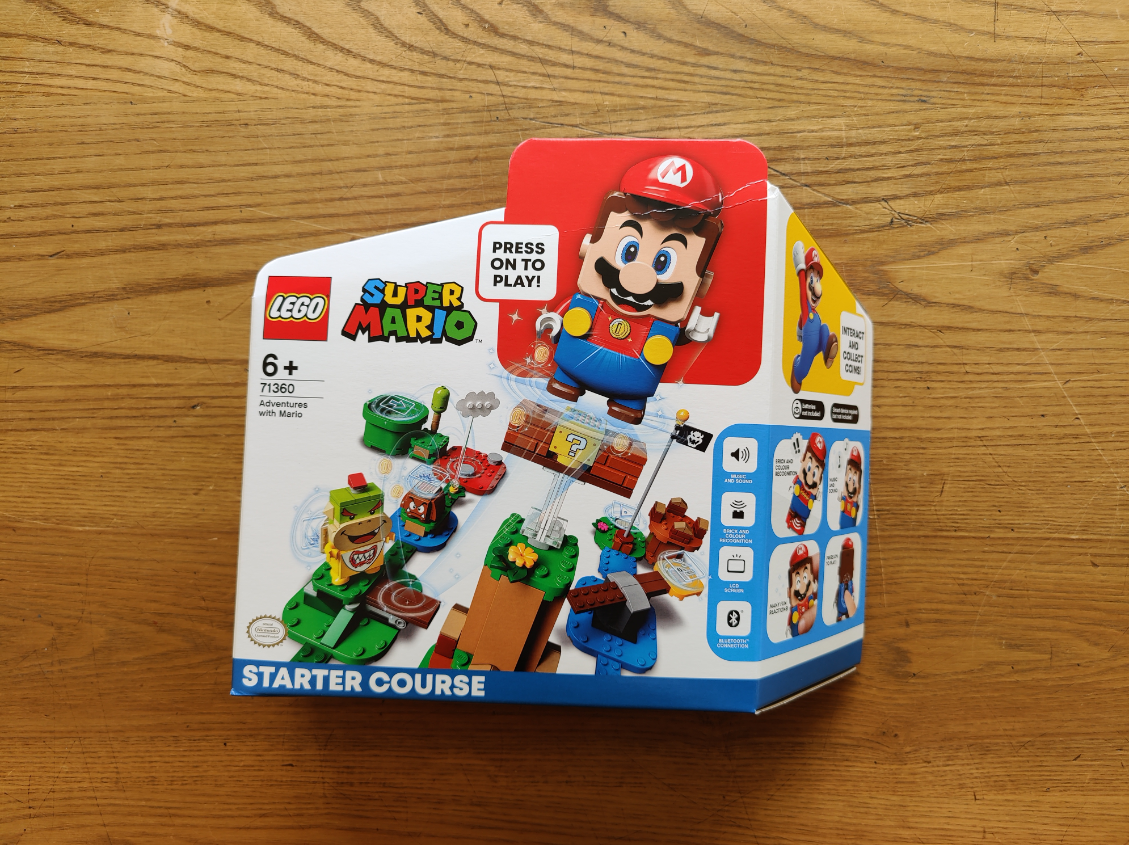
The Starter Course is where everyone should start when getting into Lego Super Mario.
Lego Super Mario sets launch on August 1st, 2020. The core set that everyone needs to buy is the Adventures with Mario Starter Course, which retails for £49.99 / $59.99. This can be pre-ordered right now at the official Lego Store. This Starter Pack contains Lego Mario himself, as well as a medium-sized amount of level Lego in which to build a course (see above image).
You can pre-order the Lego Super Mario Starter Pack in the UK here.
And you can pre-order the Lego Super Mario Starter Pack in the US here.
Get all the latest news, reviews, deals and buying guides on gorgeous tech, home and active products from the T3 experts
There are also 10 Lego Super Mario expansion sets, 4 power-up packs, and a selection of character packs, also, which can be viewed in full below with their price points:
Expansion sets
71362 – LEGO® Super Mario™ Guarded Fortress Expansion Set (49,99 USD/EUR, £44.99)
71363 – LEGO® Super Mario™ Desert Pokey Expansion Set (19,99 USD/EUR, £17.99)
71364 – LEGO® Super Mario™ Whomp’s Lava Trouble Expansion Set (19,99 USD/EUR, £17.99)
71365 – LEGO® Super Mario™ Piranha Plant Power Slide Expansion Set (29,99 USD/EUR, £24.99)
71366 – LEGO® Super Mario™ Boomer Bill Barrage Expansion Set (29,99 USD/EUR, £24.99)
71367 – LEGO® Super Mario™ Mario’s House & Yoshi Expansion Set (29,99 USD EUR, £24.99)
71368 – LEGO® Super Mario™ Toad’s Treasure Hunt Expansion Set (69,99 USD/EUR, £74.99)
71369 – LEGO® Super Mario™ Bowser’s Castle Boss Battle Expansion Set (99,99 USD/EUR, £89.99)
71376 - LEGO® Super Mario™ Thwomp Drop Expansion Set (39,99 USD/EUR, £34.99 - available only with select retailers)
71377 - LEGO® Super Mario™ King Boo and the Haunted Yard Expansion Set (49,99 USD/EUR, £44.99 - available only with select retailers)
Power-up Packs
o 71370 - LEGO® Super Mario™ Fire Mario Power-Up Pack (9,99 USD/EUR, £8.99)
o 71371 - LEGO® Super Mario™ Propeller Mario Power-Up Pack (9,99 USD/EUR, £8.99)
o 71372 - LEGO® Super Mario™ Cat Mario Power-Up Pack (9,99 USD/EUR, £8.99)
o 71373 - LEGO® Super Mario™ Builder Mario Power-Up Pack (9,99 USD/EUR, £8.99)
Character Packs
o 71361 – LEGO® Super Mario™ Character Packs (4,99 USD/3,99 EUR, £3.49)
These packs also launch on August 1st, 2020, but cannot be pre-ordered at this point. Also, note how certain sets can only be purchased at specific retailers.
Lego Super Mario review: Concept and app
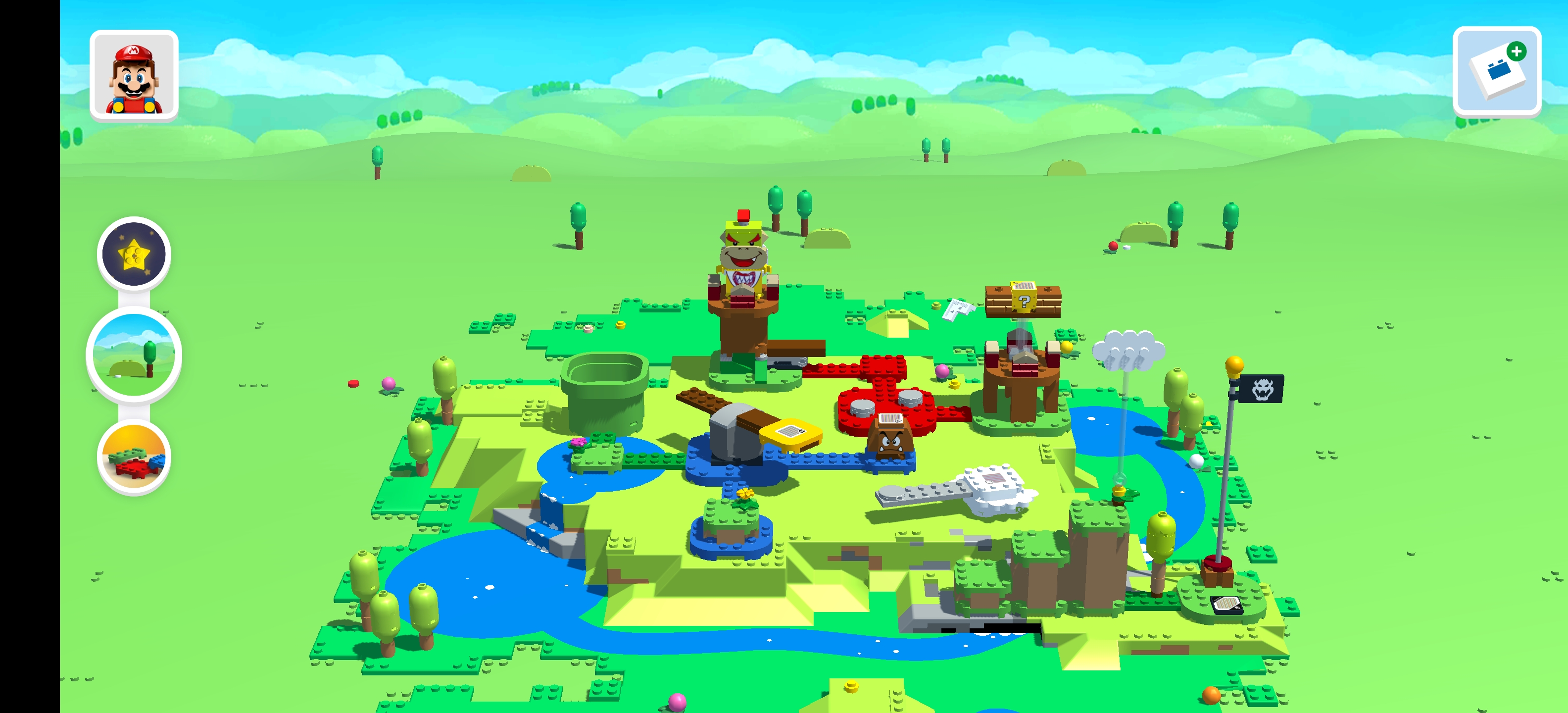
The Lego Super Mario companion app can be installed on any phone or tablet, and helps people build and record their levels.
So, the concept with Lego Super Mario is that you can create your own Super Mario levels out of Lego, with many of the famous obstacles and enemies from the games available to overcome, including Bowzer himself.
To help you build each set, though, Lego has abandoned physical build guide booklets in favour of digital instructions, which are accessed through the Lego Super Mario companion app. As you might have immediately guessed, this requires the Lego builder to have access to a smartphone or tablet.
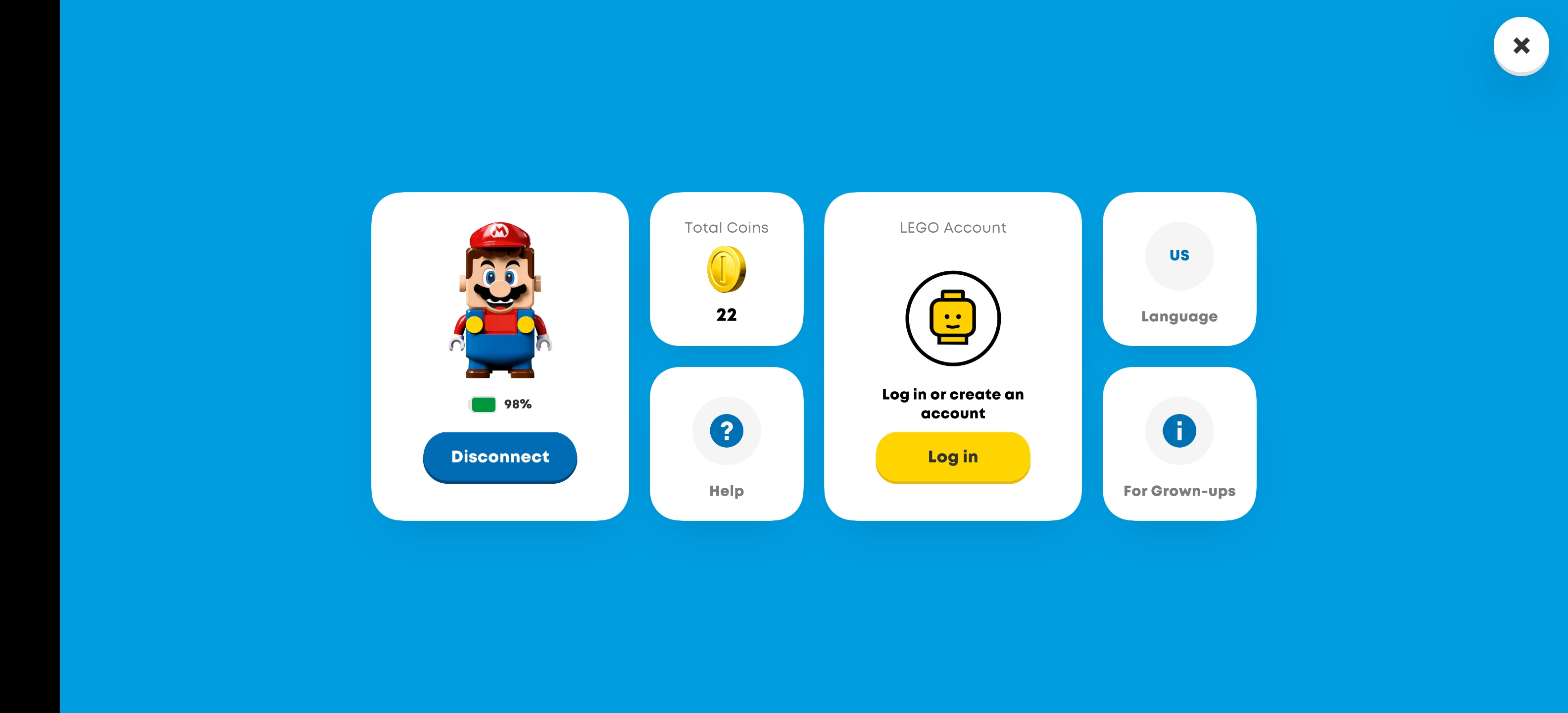
The Lego Super Mario companion app delivers digital instructions, battery information for Mario, help and support, as well as level images and records.
The app is a fundamental part of the Lego Super Mario experience, as as well providing the build instructions for each set, it also records what happens in each level run. This is achieved by a Bluetooth connection to Lego Mario himself, who has built-in smarts to read the environment around him and which enemies, coins or power-ups he is collecting (more on that later).
As such, Lego Super Mario has three waves of interaction, firstly through the building, secondly through the physical level designing and play, and thirdly a digital recording and sharing of levels and records.
Lego Super Mario review: Building and play
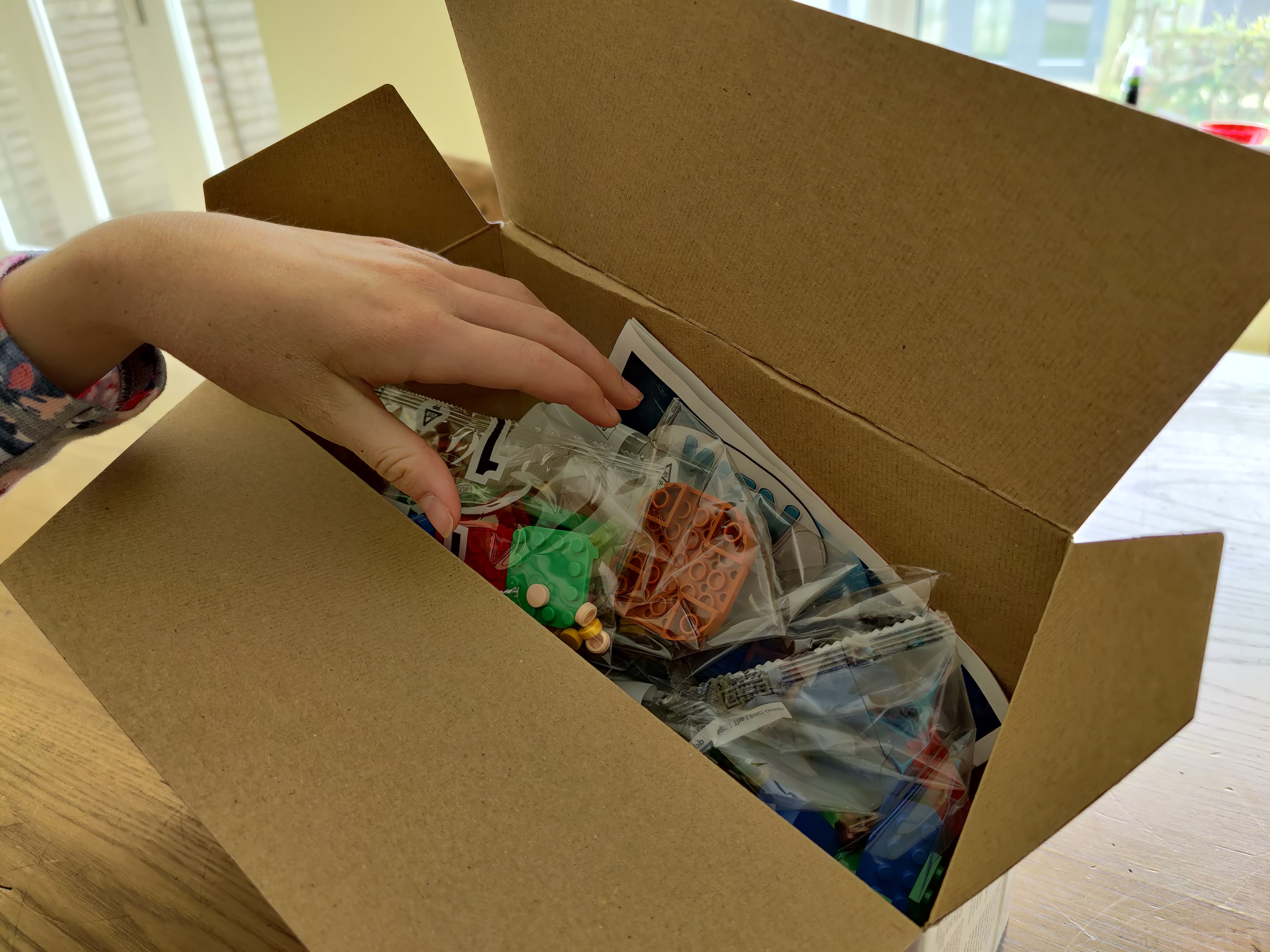
My daughter getting stuck into the Lego Super Mario starter kit...
The Adventures with Mario Starter Course is the place where everyone has to start as that is the kit that includes Lego Mario himself. Lego Mario is powered by batteries and connects via Bluetooth to the device that the Lego Mario companion app is installed on.
And, this blocky version of the Italian plumber is almost worth the entry price alone in my opinion, as he is a great realisation of the virtual character. Thanks to his battery-powered prowess, his digital eyes animate in various ways, while he has a large repertoire of orations and sounds effects to call upon depending on what he is doing. He also has a small digital screen on his body that visually displays contextual things.
Not only does Mario come in his famous red and blue outfit, but he can also change (clothes and hat) into various other versions of himself, such as Fire Mario and Cat Mario. These are Power Up Packs and grant Mario special abilities. Dot one or two through a level for some gameplay-altering mechanics (Cat Mario, for example, can collect coins while running up walls).
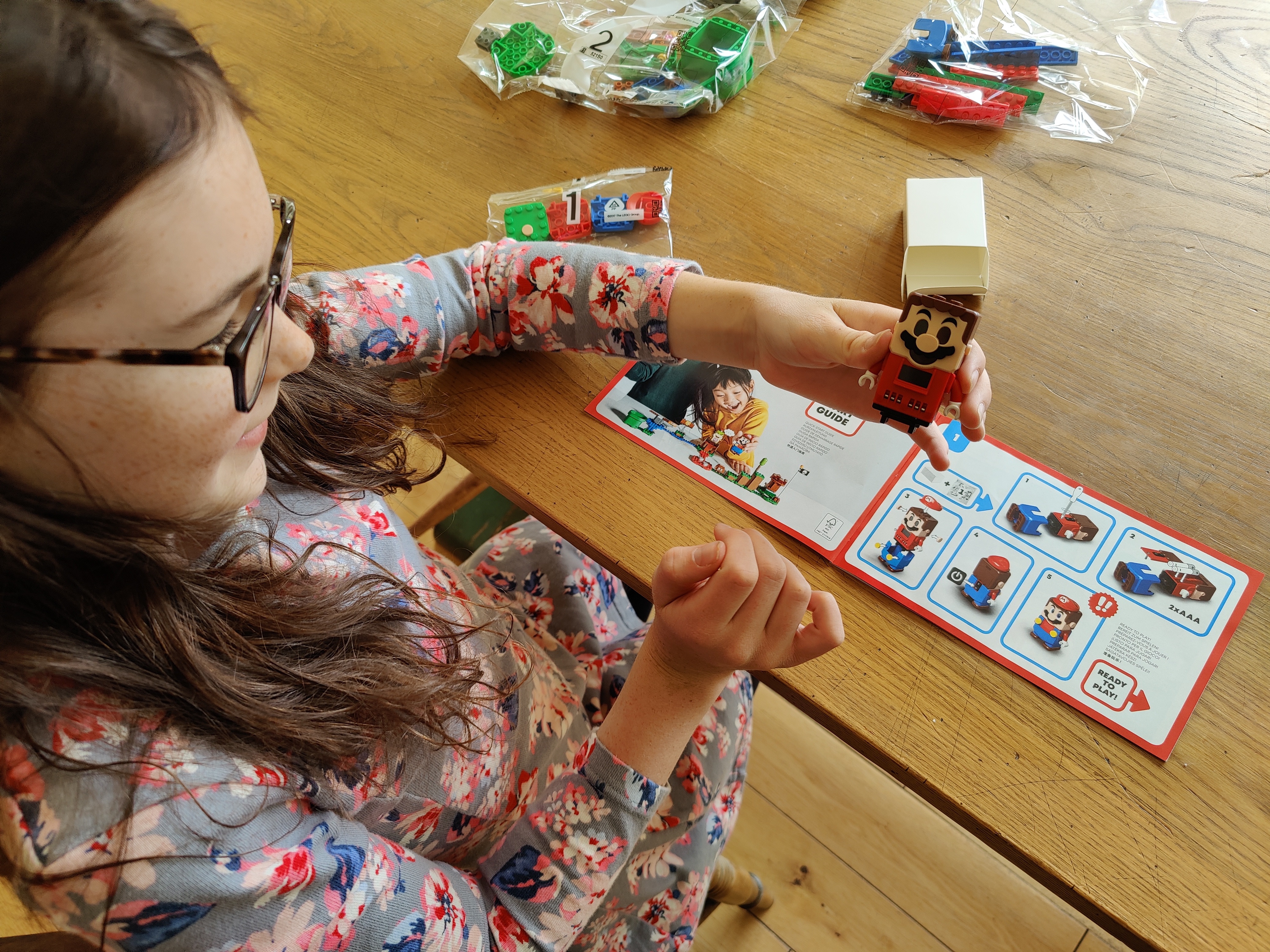
Lego Mario himself is plenty of fun just on his own!
How does Mario determine what he is doing? Well, this is where we get to the core of how Lego Super Mario works. On the bottom of Lego Mario are various sensors that continuously read what he is standing on.
These sensors on the bottom of the Mario figure can recognise different colours of terrain, and also each set's special activity blocks. These activity blocks have readable patterns on them and are all connected with specific things – so there's an activity block on the Lego Goomba's head, for example, and when you place Mario on him to stomp him, that gives Mario a bunch of coins.
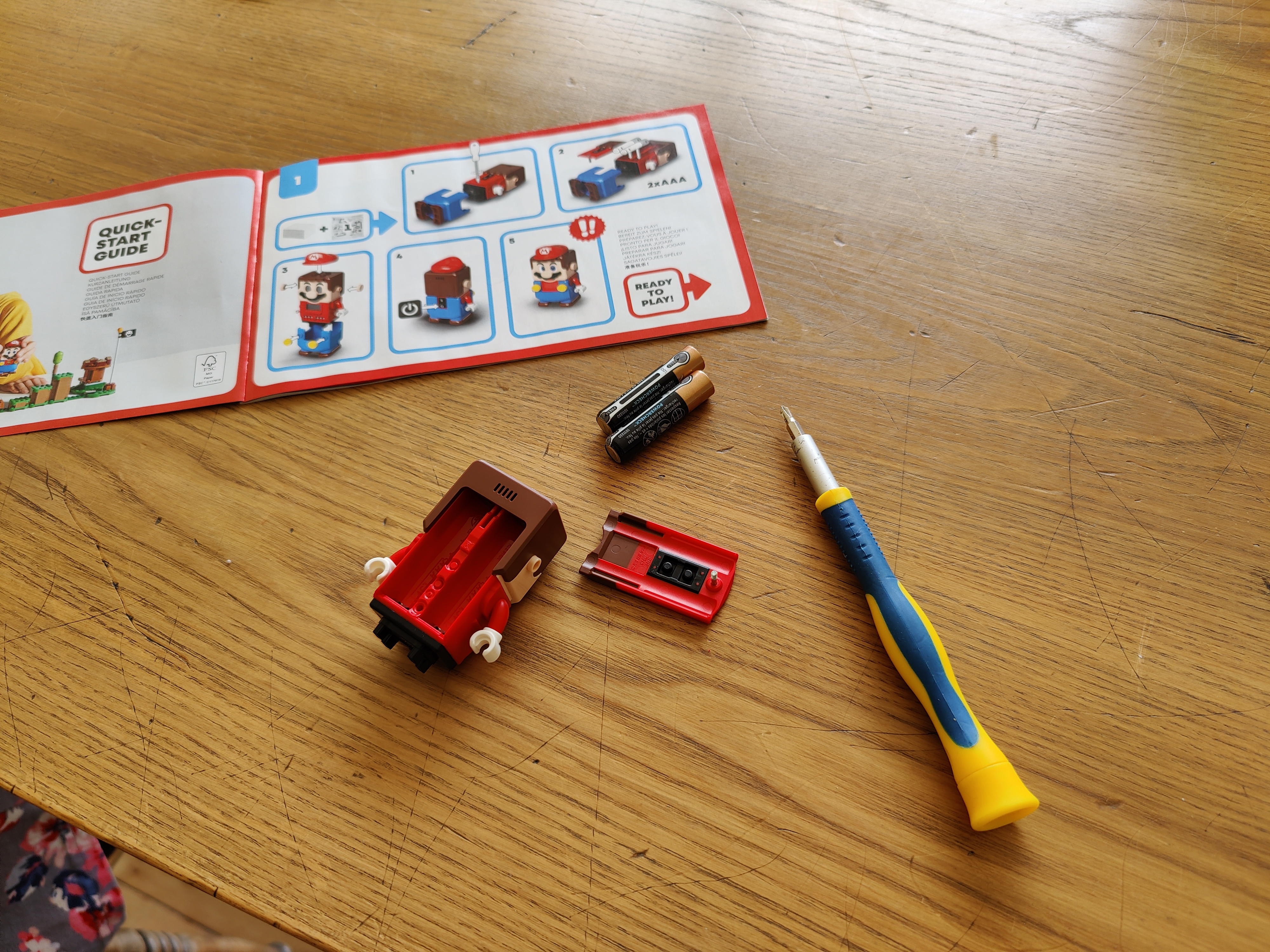
Mario is powered by a pair of AAA batteries, and a screwdriver is required to open him up.
A sensor also reads the colour of the object Mario is standing on, and this is what determines which environment Mario is in. So, for example, if Mario is standing on blue Lego, then his small chest screen will show water and there is a water sound effect played as if he is swimming.
Equally, if he is standing on red blocks for example, then that represents lava in Lego Super Mario and, as such, fire appears on Lego Mario's chest screen and his eyes get all crossed and you will hear him shouting "ow! ow! ow!". Stand too long on red blocks and Mario will audible perish and it will be game over until the next run begins.
The great thing with this colour detection mechanic is that it makes it easy to augment any official Lego Super Mario sets with just generic Lego, which can be used to expand levels. Green for terrain, blue for water, and red for lava. Considering that buying all the currently announced sets would set you back over $450 is the United States, this is a welcome, money-saving feature.
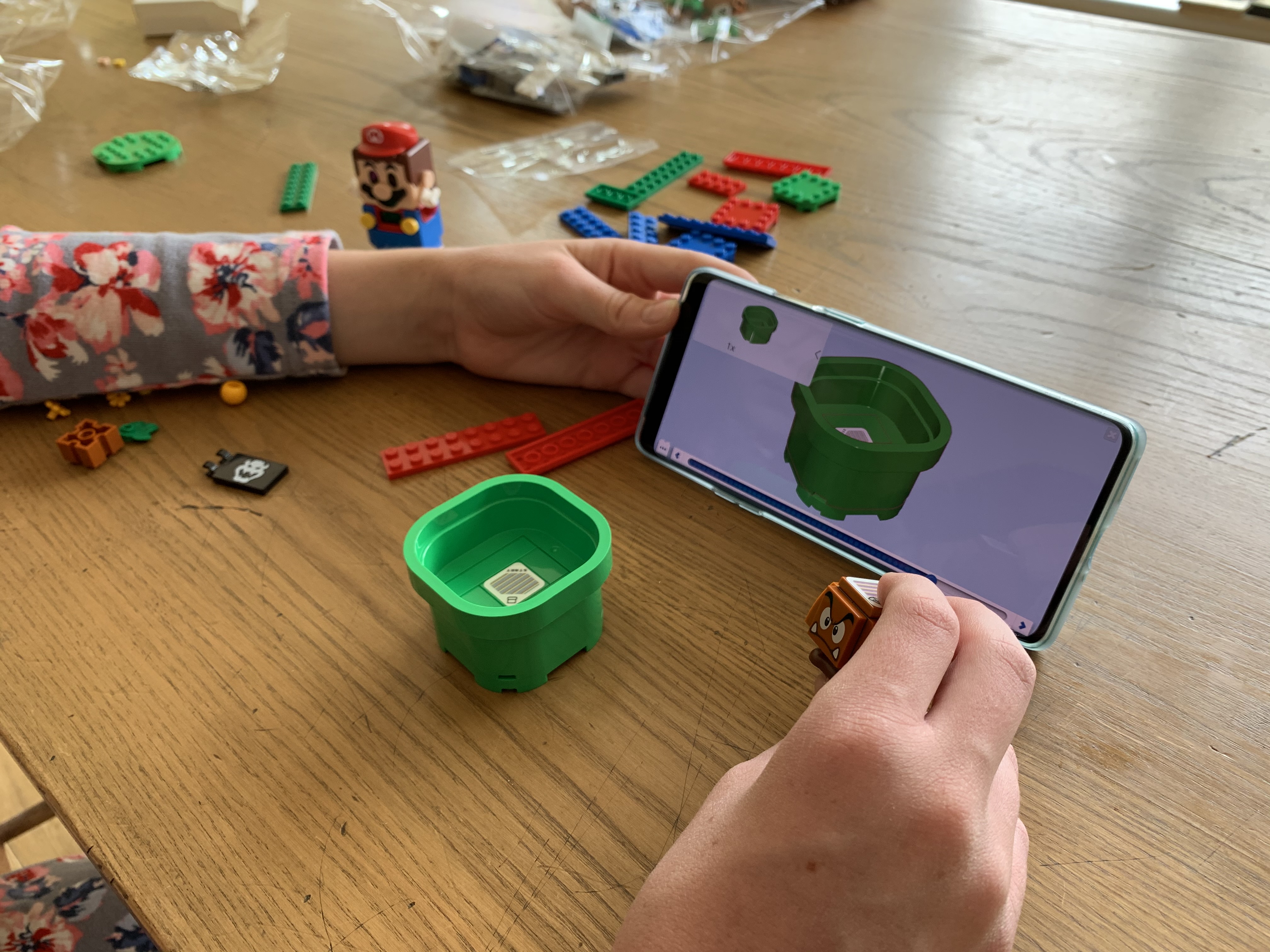
The digital instructions allow objects to be rotated on screen, which is very handy for seeing what goes where.
And talking of level runs, each level begins by touching Mario on his Lego pipe (as if he is coming out of the pipe) and finished by Mario standing on the end flag platform (again, just like in classic Super Mario games).
As soon as Mario emerges from his pipe he has 60 seconds to reach the end flag, providing of course he doesn't pick up an extra time powerup on his level run. Don't reach the flag in time and that run is a game over. As such, unless you want to be very, very fast, larger levels definitely benefit from extra time, we comes from an time extender action block. If Mario stands on this block then he gets 30 more seconds.
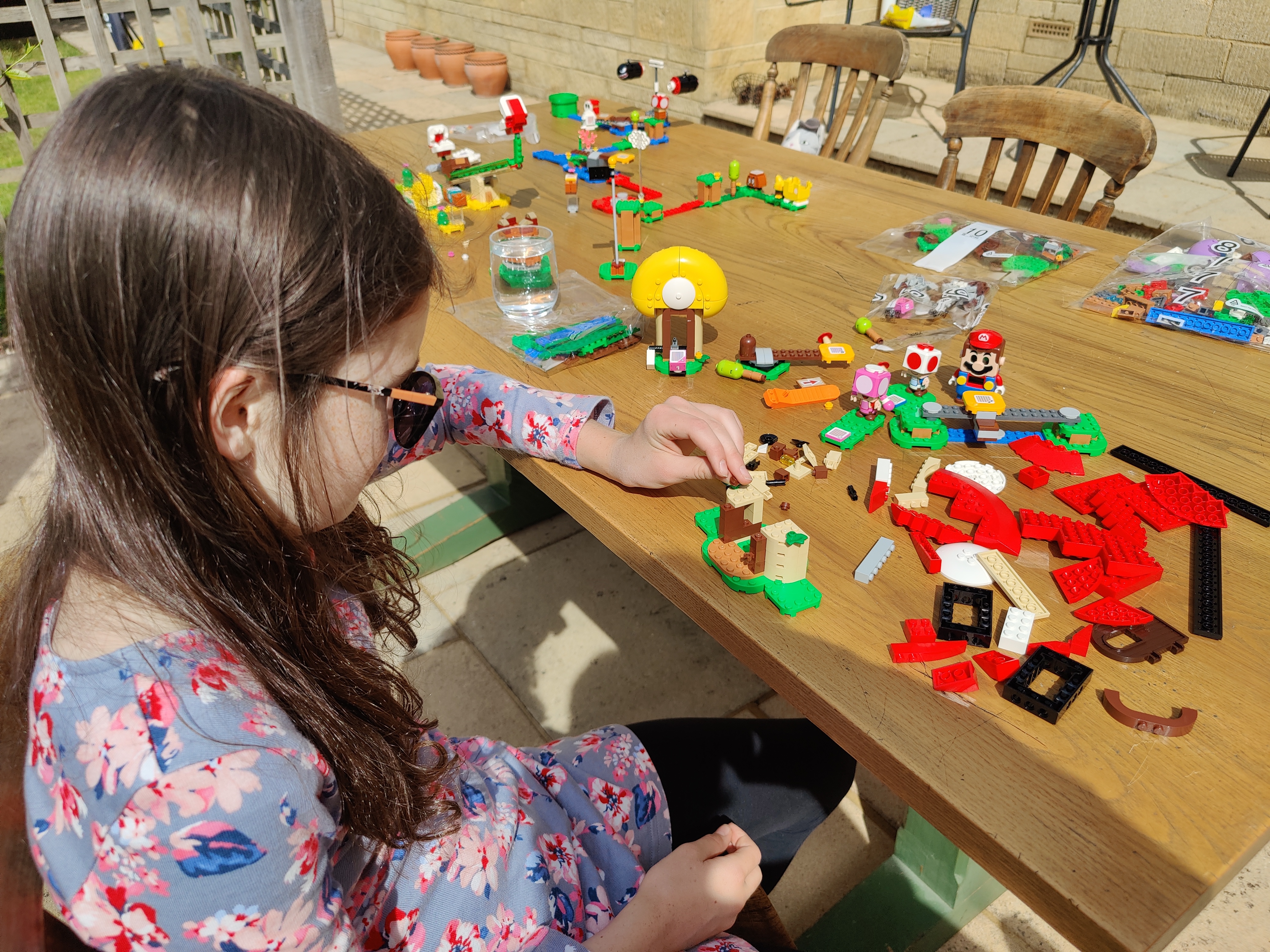
My daughter enjoying some fine weather while building the Toad's Treasure Hunt expansion set.
As well as defeating baddies on the level by stomping on them a set number of times (Lego Mario's sensor reads the baddies' codes), Lego Mario can also navigate a series of obstacles, which come in many of the expansions sets you can buy.
A good example is the Piranha Plant Power Slide Expansion Set, which once built can be adopted into a level and allows Mario to stand on a movable mine cart on a rail between two Piranha Plant baddies. By carefully rocking Mario backwards and forwards the player can earn big coins, but if Mario hits a Piranha Plant then he gets damaged and loses coins.
Another good example of these challenge kits is the Bullet Bill expansion set, which sees Mario having to dodge two large flying Bullet Bills to progress in a level.
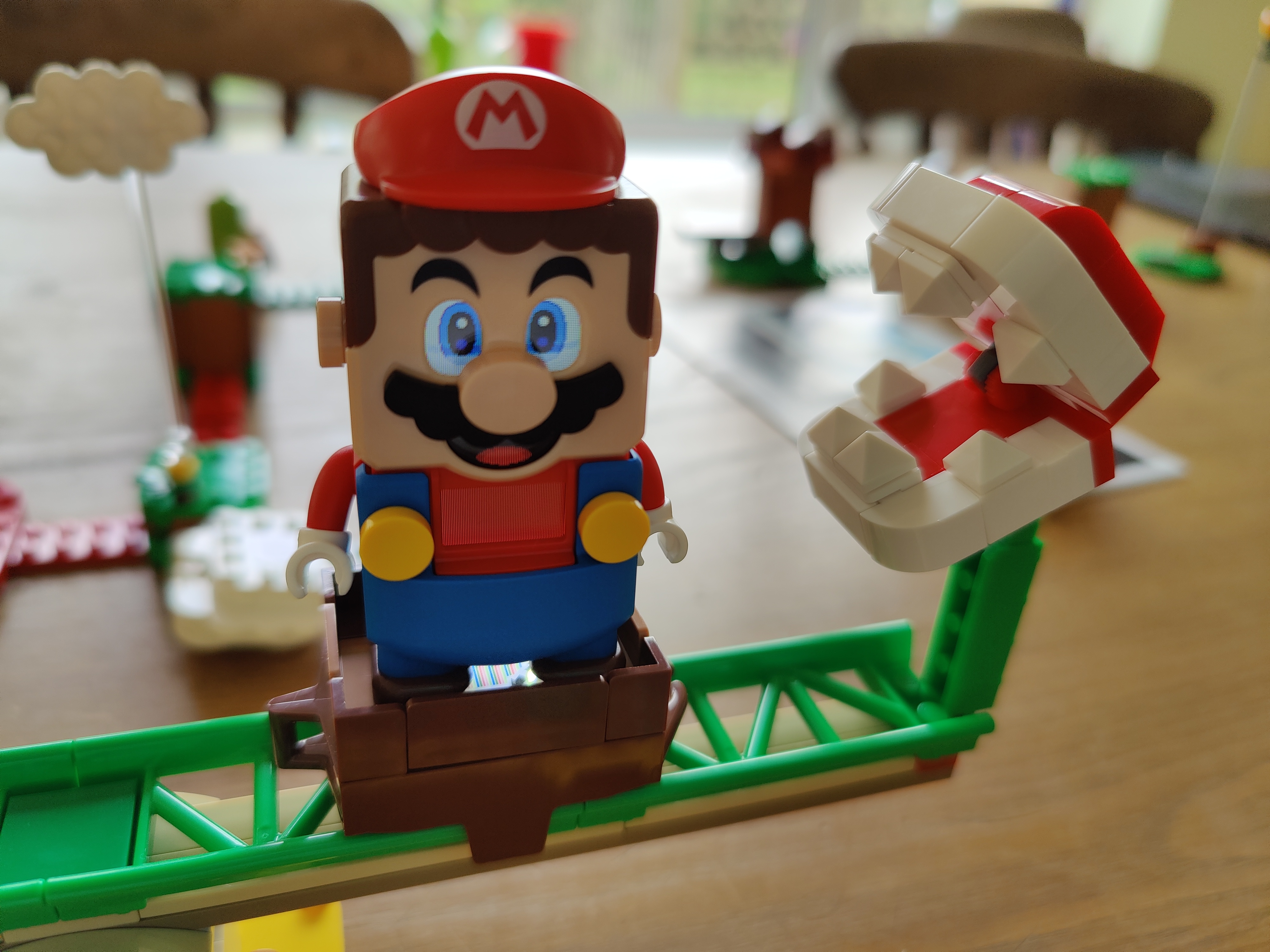
Don't get chomped by the snappy Piranha Plants, Lego Mario!
These sorts of risk-reward mechanics typify these expansion sets and help add elements of challenge into each level. Remember, each run is recorded by the connected companion app, so how many coins collected, what power ups picked up, which baddies defeated, and which challenges completed in each run are saved.
This is good as an element of competition is added, and it means levels can be attempted by multiple different people to see who can do it best. Very similar to how you would do so in a video game, which these sets are trying to recreate in the physical world.
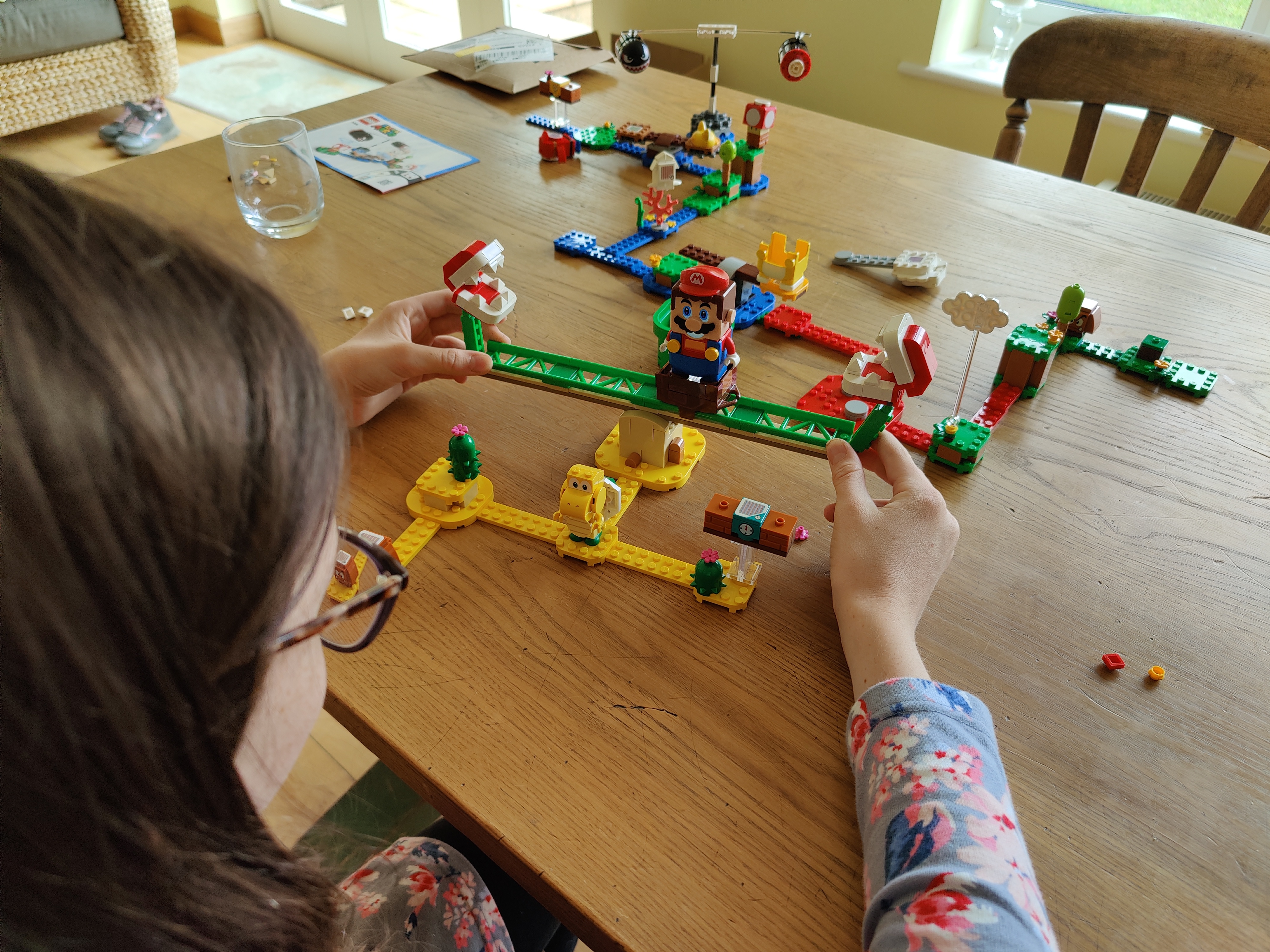
Ela collecting coins by sliding Mario between two snappy Piranha Plants.
Of course, the final flourish for each build, play and record is the saving of the level and its records. When a level has been built, players can use the companion app to to take a picture of their creation, to which the run records are tied, and then by signing in to a Lego account, these levels can be shared online with other Lego Super Mario users.
It's a great mechanic as it allows friends to share their creations and challenge each other, even remotely, to build the level and then run it to the best of their ability.
Lego Super Mario review: verdict
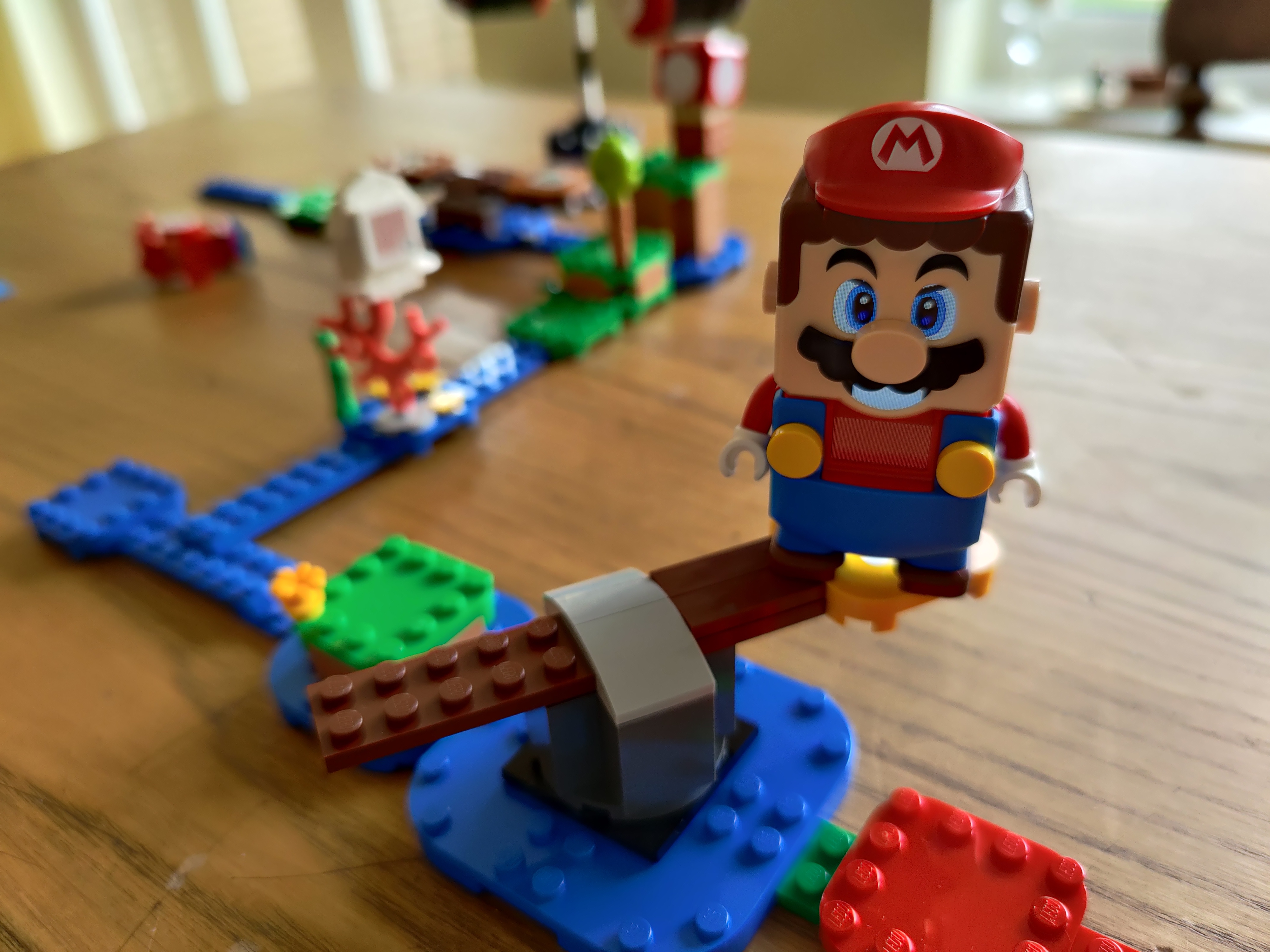
My daughter and I had top fun with Lego Super Mario, and seems a no-brainer purchase for fans of the games.
For my daughter Lego Super Mario was absolutely brilliant. She had played Super Mario video games, such as Super Mario Odyssey, as well as the brilliant creat-'em-up Super Mario Maker, too.
So she was coming at these sets with a very good idea of who Mario is and what a Super Mario level could look like. For her, actually designing levels has always been one of her favourite activities, and as as a result her Nintendo Switch is stuffed with mad creations through which Mario has to navigate.
She also has a 4 or 5 years now under her belt building Lego sets, including some of the recent interactive play Hidden World sets which have a digital element.
So, when it came round the pitch for Lego Super Mario, that you build Mario levels from Lego, as well as characters and interactive challenges, and then you can record your creations and level runs digitally, she was 100% on board.
As a mature 10-year-old I feel these sets also were just perfect in terms of demographic and, as a result, she had a great time building and playing with them.
From just playing with actual Lego Super Mario himself, who's expressive eyes and audible orations are almost worth the entry cost alone, through building classic Mario baddies and obstacles like Bullet Bills and Piranha Plants, and then racing against the clock through her creation to get to the end flag, she really got on super well with the Lego Super Mario concept.
There's no doubting that I myself warmed to the sets as well due to a youth playing with the portly Italian plumber and his friends and, while I can absolutely see that the financial outlay is large for anyone who wants to be able to get the most from the concept (I'd say you need a minimum of two sets and more like three or four to be able to create a large level), the quality on display and the possible fun to be had is huge.
For a fair few years now Lego has been toying with the idea of a digital play aspect to some of its lines, and I think Lego Super Mario is the strongest example yet, allowing children (or adults!) to build something they can display, but also play with that very thing physically and digitally. In this case the digital aspect allows levels to be photographed and shared, as well as results recorded, while the Lego Super Mario app also takes build instructions to a new level of clarity.
Overall, then, I think it safe to say that any gamer, of almost any age, will have fun with Lego Super Mario. It is one of the most faithful physical re-creations of a virtual world and characters we've seen yet in toy form and slickly bridges the collectable, play and digital interaction spheres of the hobby.

Rob has been writing about computing, gaming, mobile, home entertainment technology, toys (specifically Lego and board games), smart home and more for over 15 years. As the editor of PC Gamer, and former Deputy Editor for T3.com, you can find Rob's work in magazines, bookazines and online, as well as on podcasts and videos, too. Outside of his work Rob is passionate about motorbikes, skiing/snowboarding and team sports, with football and cricket his two favourites.